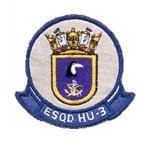SYRIA
Moderador: Conselho de Moderação
- P44
- Sênior

- Mensagens: 55308
- Registrado em: Ter Dez 07, 2004 6:34 am
- Localização: O raio que vos parta
- Agradeceu: 2765 vezes
- Agradeceram: 2445 vezes
- P44
- Sênior

- Mensagens: 55308
- Registrado em: Ter Dez 07, 2004 6:34 am
- Localização: O raio que vos parta
- Agradeceu: 2765 vezes
- Agradeceram: 2445 vezes
Re: SYRIA
Russia Announces The Complete Destruction Of ISIS In Syria
Tyler Durden's picture
by Tyler Durden
Dec 6, 2017 8:55 PM
In a historic moment, ignored by much of Western media, Russian military officials have announced the complete and utter defeat of ISIS in Syria. The Russian General Staff issued a statement Wednesday declaring that all territories previously under terrorist control were liberated in a final push by the Syrian Army this week, and with the support of Russian forces.
“All terrorist units of ISIS on Syrian soil have been destroyed, and the territory is liberated,” Armed Forces Chief of Staff General Valery Gerasimov said in comments translated and published by RT. "Therefore, as of today, there’s no territory controlled by ISIS in Syria,” he added. The announcement came during an annual briefing for foreign military attaches, and incidentally on the same day President Trump gave an extremely controversial televised address wherein he gave official US recognition of Jerusalem as the capital of Israel, thus it could mean that the demise of one problem could give rise to another in an increasingly volatile and explosive Middle East environment.
The rapid collapse of ISIS - which once controlled an area the size of Britain stretching from the edges of Aleppo to Mosul in Iraq, and down to Ramadi and Fallujah - began in earnest in early September when the Syrian Army breached ISIS lines around Deir Ezzor city, after which the city was fully liberated by early November. As ISIS retreated in the Deir Ezzor countryside, it lost its previous Syrian capital of Raqqa in mid-October to the US-backed Syrian Democratic Forces (SDF), which also struck a deal to allow the quick exit of ISIS terrorists to other parts of Syria and region, according to a report by the BBC.
http://www.zerohedge.com/news/2017-12-0 ... isis-syria
Tyler Durden's picture
by Tyler Durden
Dec 6, 2017 8:55 PM
In a historic moment, ignored by much of Western media, Russian military officials have announced the complete and utter defeat of ISIS in Syria. The Russian General Staff issued a statement Wednesday declaring that all territories previously under terrorist control were liberated in a final push by the Syrian Army this week, and with the support of Russian forces.
“All terrorist units of ISIS on Syrian soil have been destroyed, and the territory is liberated,” Armed Forces Chief of Staff General Valery Gerasimov said in comments translated and published by RT. "Therefore, as of today, there’s no territory controlled by ISIS in Syria,” he added. The announcement came during an annual briefing for foreign military attaches, and incidentally on the same day President Trump gave an extremely controversial televised address wherein he gave official US recognition of Jerusalem as the capital of Israel, thus it could mean that the demise of one problem could give rise to another in an increasingly volatile and explosive Middle East environment.
The rapid collapse of ISIS - which once controlled an area the size of Britain stretching from the edges of Aleppo to Mosul in Iraq, and down to Ramadi and Fallujah - began in earnest in early September when the Syrian Army breached ISIS lines around Deir Ezzor city, after which the city was fully liberated by early November. As ISIS retreated in the Deir Ezzor countryside, it lost its previous Syrian capital of Raqqa in mid-October to the US-backed Syrian Democratic Forces (SDF), which also struck a deal to allow the quick exit of ISIS terrorists to other parts of Syria and region, according to a report by the BBC.
http://www.zerohedge.com/news/2017-12-0 ... isis-syria
Triste sina ter nascido português 
- P44
- Sênior

- Mensagens: 55308
- Registrado em: Ter Dez 07, 2004 6:34 am
- Localização: O raio que vos parta
- Agradeceu: 2765 vezes
- Agradeceram: 2445 vezes
Re: SYRIA
The pundits were wrong about Assad and the Islamic State. As usual, they're not willing to admit it
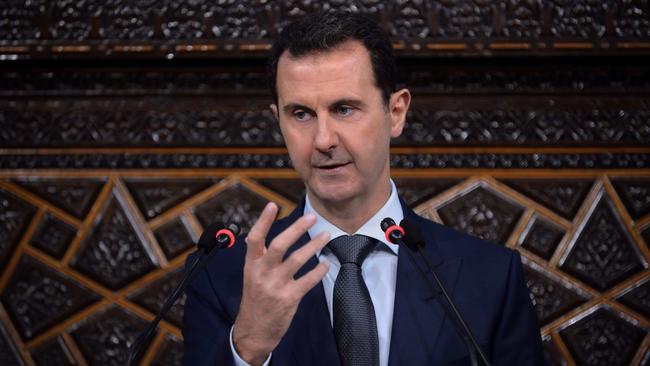
Syrian President Bashar Assad gives a speech at the parliament building in Damascus, Syria on June 7. (Associated Press via Syrian official news agency SANA)
Max Abrahms and John Glaser
The Islamic State is a shadow of its former self. In 2014, the extremist group seemed to make substantial inroads in achieving its stated goal of a caliphate. It boasted tens of thousands of fighters and territorial control over an area roughly the size of South Korea. By almost every metric, Islamic State has collapsed in its Syria stronghold, as well as in Iraq. As a former foreign fighter recently admitted, “It’s over: there is no more Daesh left,” using an Arabic acronym for Islamic State.
The rollback of Islamic State must come as a shock to the chorus of journalists and analysts who spent years insisting that such progress would never happen without toppling the regime of Bashar Assad — which is, of course, still standing. A cavalcade of opinion makers long averred that Islamic State would thrive in Syria so long as Assad ruled because the Syrian Arab Army was part of the same disease.
John Bolton, former United Nations ambassador under George W. Bush, insisted in the New York Times that “defeating the Islamic State” is “neither feasible nor desirable” if Assad remains in power. Writing in the Wall Street Journal, Sens. John McCain and Lindsey Graham asserted that “defeating Islamic State also requires defeating Bashar Assad.” Kenneth Pollack of the Brookings Institution prescribed a policy of “building a new Syrian opposition army capable of defeating both President Bashar al-Assad and the more militant Islamists.” Similarly, Max Boot, a contributing writer to this newspaper, argued that vanquishing Islamic State was futile unless the U.S. also moved to depose the “Alawite regime in Damascus.” Like other regime-change salesmen, he pitched a no-fly zone across the country to facilitate airstrikes against the Assad government, while boosting aid to the so-called moderate rebels.
For Islamic State, the “opportunity model” of terrorism was always a better fit than the “grievance model.”
Prominent Syria analysts also claimed that Assad supported, even sponsored Islamic State. CNN’s Michael Weiss pushed the line that Assad and Russian President Vladimir Putin would not fight Islamic State and that Syria and Russia were the group’s “unacknowledged air force.” His co-author, Hassan Hassan, contended that the Syrian regime must go because “Assad has never fought [Islamic State] before.”
For a while, everywhere one looked, the media was peddling the same narrative. The Daily Beast described Islamic State fighters as “Assad’s henchmen.” The New York Times promoted the idea that “Assad’s forces” have been “aiding” Islamic State by “not only avoiding” the group “but actively seeking to bolster their position.” Time parroted the pro-regime-change line that “Bashar Assad won't fight” Islamic State.
But these popular arguments were, to put it mildly, empirically challenged.
The case for regime change in Damascus was reminiscent of the one cooked up for Baghdad in 2003: Interventionists played on American fears by pretending that the strongmen were in direct cahoots with Salafi jihadists (the ultra-conservative movement within Sunni Islam). The evidence of Assad sponsoring Islamic State, however, was about as strong as for Saddam Hussein sponsoring Al Qaeda.
As the Syria expert Aymenn Jawad Al-Tamimi noted in February 2014, Islamic State “has a record of fighting the regime on multiple fronts, including the Sheikh Said area of Aleppo province, Kwiris military airbase (where an offensive is ongoing under the leadership of muhajireen battalion Suqur al-Izz, in coordination with the Green Battalion, [Islamic State] and Jabhat al-Nusra), Nubl and Zahara, Brigade 17 airbase in Raqqa province, Tabqa military airport, Qalamoun, Sayyida Zainab, Sakhna in Homs desert, the Qamishli area, and Latakia province. Besides these locations, one should also remember [Islamic State’s] leading role in the capture of Mannagh airbase.”
The notion that Assad “won’t fight” Islamic State was always wrong. The notion that “defeating Islamic State also requires defeating Bashar Assad” was, likewise, always wrong. By now it should be obvious that the Syrian Arab Army has played a role in degrading Islamic State in Syria — not alone, of course, but with Russian and Iranian partners, not to mention the impressive U.S.-led coalition. In marked contrast to pundit expectations, the group’s demise was inversely related to Assad’s power. Islamic State’s fortunes decreased as his influence in the country increased.
Equally contrary to analyst predictions, the group imploded right after external support for the “moderate” rebels dried up. The weakening of the rebels was a major setback for Islamic State because Assad could finally focus his firepower on the group. Fewer weapon shipments into the theater, moreover, meant fewer arms fell into the hands of Salafi jihadists.
How strange, then, that we haven’t heard many pundits acknowledge their mistakes; they’re not itching to atone for having almost forced another regime-change mission based on discredited analysis.
The now-defunct conventional wisdom was not only stubbornly anti-empirical, but unmoored from the political science literature. With few exceptions, international relations scholars seemed content to stand back and watch think tank pundits do the day-to-day Syria analysis while ignoring the red flags dotting the research landscape.
Some of the best political science research over the past couple of decades finds that militants are less likely to emerge in response to political grievances than from propitious conditions for them to organize. For Islamic State, the “opportunity model” of terrorism was always a better fit than the “grievance model.” After all, this is a group that set up shop in the desert, far away from the Syrian military; preyed on soft targets like the Yazidis who never oppressed the Sunni population; and planted affiliates in countries known not for their anti-Sunni government, but the lack of a functioning one.
As in Iraq a decade earlier, regime change in Syria would have created the ultimate power vacuum for Islamic State to flourish.
Moreover, the notion that pumping arms and fighters into Syria would mitigate the unrest is actually the opposite of what study after study has established. The conflict literature makes clear that external support for the opposition tends to exacerbate and extend civil wars, which usually peter out not through power-sharing agreements among fighting equals, but when one side — typically, the incumbent — achieves dominance.
The Realist paradigm reminds us that the U.S. need not share the same ideology of a nasty international actor to countenance working with him against a mutual foe. With its sensitivity to overspending and blowback, Realism also emphasizes the dangers of militarily picking foreign governments around the world.
Although the Islamic State’s caliphate is dead, Assad’s war on terrorists in Syria is very much alive. Let’s hope future analysis of this conflict avoids the kind of anti-empirical ideological advocacy that helped give rise to Al Qaeda in Iraq and then Islamic State in the first place.
Max Abrahms is a professor of political science at Northeastern University and a term member of the Council on Foreign Relations. John Glaser is director of foreign policy studies at the Cato Institute.
http://www.latimes.com/opinion/op-ed/la ... story.html
Syrian President Bashar Assad gives a speech at the parliament building in Damascus, Syria on June 7. (Associated Press via Syrian official news agency SANA)
Max Abrahms and John Glaser
The Islamic State is a shadow of its former self. In 2014, the extremist group seemed to make substantial inroads in achieving its stated goal of a caliphate. It boasted tens of thousands of fighters and territorial control over an area roughly the size of South Korea. By almost every metric, Islamic State has collapsed in its Syria stronghold, as well as in Iraq. As a former foreign fighter recently admitted, “It’s over: there is no more Daesh left,” using an Arabic acronym for Islamic State.
The rollback of Islamic State must come as a shock to the chorus of journalists and analysts who spent years insisting that such progress would never happen without toppling the regime of Bashar Assad — which is, of course, still standing. A cavalcade of opinion makers long averred that Islamic State would thrive in Syria so long as Assad ruled because the Syrian Arab Army was part of the same disease.
John Bolton, former United Nations ambassador under George W. Bush, insisted in the New York Times that “defeating the Islamic State” is “neither feasible nor desirable” if Assad remains in power. Writing in the Wall Street Journal, Sens. John McCain and Lindsey Graham asserted that “defeating Islamic State also requires defeating Bashar Assad.” Kenneth Pollack of the Brookings Institution prescribed a policy of “building a new Syrian opposition army capable of defeating both President Bashar al-Assad and the more militant Islamists.” Similarly, Max Boot, a contributing writer to this newspaper, argued that vanquishing Islamic State was futile unless the U.S. also moved to depose the “Alawite regime in Damascus.” Like other regime-change salesmen, he pitched a no-fly zone across the country to facilitate airstrikes against the Assad government, while boosting aid to the so-called moderate rebels.
For Islamic State, the “opportunity model” of terrorism was always a better fit than the “grievance model.”
Prominent Syria analysts also claimed that Assad supported, even sponsored Islamic State. CNN’s Michael Weiss pushed the line that Assad and Russian President Vladimir Putin would not fight Islamic State and that Syria and Russia were the group’s “unacknowledged air force.” His co-author, Hassan Hassan, contended that the Syrian regime must go because “Assad has never fought [Islamic State] before.”
For a while, everywhere one looked, the media was peddling the same narrative. The Daily Beast described Islamic State fighters as “Assad’s henchmen.” The New York Times promoted the idea that “Assad’s forces” have been “aiding” Islamic State by “not only avoiding” the group “but actively seeking to bolster their position.” Time parroted the pro-regime-change line that “Bashar Assad won't fight” Islamic State.
But these popular arguments were, to put it mildly, empirically challenged.
The case for regime change in Damascus was reminiscent of the one cooked up for Baghdad in 2003: Interventionists played on American fears by pretending that the strongmen were in direct cahoots with Salafi jihadists (the ultra-conservative movement within Sunni Islam). The evidence of Assad sponsoring Islamic State, however, was about as strong as for Saddam Hussein sponsoring Al Qaeda.
As the Syria expert Aymenn Jawad Al-Tamimi noted in February 2014, Islamic State “has a record of fighting the regime on multiple fronts, including the Sheikh Said area of Aleppo province, Kwiris military airbase (where an offensive is ongoing under the leadership of muhajireen battalion Suqur al-Izz, in coordination with the Green Battalion, [Islamic State] and Jabhat al-Nusra), Nubl and Zahara, Brigade 17 airbase in Raqqa province, Tabqa military airport, Qalamoun, Sayyida Zainab, Sakhna in Homs desert, the Qamishli area, and Latakia province. Besides these locations, one should also remember [Islamic State’s] leading role in the capture of Mannagh airbase.”
The notion that Assad “won’t fight” Islamic State was always wrong. The notion that “defeating Islamic State also requires defeating Bashar Assad” was, likewise, always wrong. By now it should be obvious that the Syrian Arab Army has played a role in degrading Islamic State in Syria — not alone, of course, but with Russian and Iranian partners, not to mention the impressive U.S.-led coalition. In marked contrast to pundit expectations, the group’s demise was inversely related to Assad’s power. Islamic State’s fortunes decreased as his influence in the country increased.
Equally contrary to analyst predictions, the group imploded right after external support for the “moderate” rebels dried up. The weakening of the rebels was a major setback for Islamic State because Assad could finally focus his firepower on the group. Fewer weapon shipments into the theater, moreover, meant fewer arms fell into the hands of Salafi jihadists.
How strange, then, that we haven’t heard many pundits acknowledge their mistakes; they’re not itching to atone for having almost forced another regime-change mission based on discredited analysis.
The now-defunct conventional wisdom was not only stubbornly anti-empirical, but unmoored from the political science literature. With few exceptions, international relations scholars seemed content to stand back and watch think tank pundits do the day-to-day Syria analysis while ignoring the red flags dotting the research landscape.
Some of the best political science research over the past couple of decades finds that militants are less likely to emerge in response to political grievances than from propitious conditions for them to organize. For Islamic State, the “opportunity model” of terrorism was always a better fit than the “grievance model.” After all, this is a group that set up shop in the desert, far away from the Syrian military; preyed on soft targets like the Yazidis who never oppressed the Sunni population; and planted affiliates in countries known not for their anti-Sunni government, but the lack of a functioning one.
As in Iraq a decade earlier, regime change in Syria would have created the ultimate power vacuum for Islamic State to flourish.
Moreover, the notion that pumping arms and fighters into Syria would mitigate the unrest is actually the opposite of what study after study has established. The conflict literature makes clear that external support for the opposition tends to exacerbate and extend civil wars, which usually peter out not through power-sharing agreements among fighting equals, but when one side — typically, the incumbent — achieves dominance.
The Realist paradigm reminds us that the U.S. need not share the same ideology of a nasty international actor to countenance working with him against a mutual foe. With its sensitivity to overspending and blowback, Realism also emphasizes the dangers of militarily picking foreign governments around the world.
Although the Islamic State’s caliphate is dead, Assad’s war on terrorists in Syria is very much alive. Let’s hope future analysis of this conflict avoids the kind of anti-empirical ideological advocacy that helped give rise to Al Qaeda in Iraq and then Islamic State in the first place.
Max Abrahms is a professor of political science at Northeastern University and a term member of the Council on Foreign Relations. John Glaser is director of foreign policy studies at the Cato Institute.
http://www.latimes.com/opinion/op-ed/la ... story.html
Triste sina ter nascido português 
- FCarvalho
- Sênior

- Mensagens: 38030
- Registrado em: Sex Mai 02, 2003 6:55 pm
- Localização: Manaus
- Agradeceu: 5756 vezes
- Agradeceram: 3277 vezes
Re: SYRIA
Estão pilulando notícias na net, principalmente no Sputinks, de que russos e americanos estão a beira de um ataque de nervos em relação à atuação de suas aviações de combate na Síria, sendo o mais recente comentário de que os americanos se "veriam forçados" a abater caças russos que ameacem suas forças áreas e terrestres a leste do Eufrates.
Isso está ficando cada vez mais interessante. O que será que acontece se um caça russo for derrubado pelos yankees "no seu espaço aéreo na Síria"?
abs
Isso está ficando cada vez mais interessante. O que será que acontece se um caça russo for derrubado pelos yankees "no seu espaço aéreo na Síria"?
abs
Carpe Diem
- J.Ricardo
- Sênior

- Mensagens: 7635
- Registrado em: Qui Jan 13, 2005 1:44 pm
- Agradeceu: 2573 vezes
- Agradeceram: 1045 vezes
Re: SYRIA
Isso que é complicado, na verdade os únicos com legitimidade lá são os russos...
Não temais ímpias falanges,
Que apresentam face hostil,
Vossos peitos, vossos braços,
São muralhas do Brasil!
Que apresentam face hostil,
Vossos peitos, vossos braços,
São muralhas do Brasil!
- Bolovo
- Sênior

- Mensagens: 28560
- Registrado em: Ter Jul 12, 2005 11:31 pm
- Agradeceu: 547 vezes
- Agradeceram: 442 vezes
Re: SYRIA
Gostaria de saber o que os EUA estão fazendo por lá, sendo que o ISIS já foi declarado derrotado tanto na Síria como no Iraque durante essa semana. E é aquilo que o Ricardo aí disse. A Síria, goste do Assad ou não, ainda é um país soberano, representado na ONU, que pediu suporte ao governo russo e esse atendeu o pedido enviando uma força expedicionária. A coalizão liderada pelos EUA está atuando na Síria de maneira ilegal (é um fato, não uma opinião), então quem são eles para falar os russos ou os sírios podem ou não fazer em seu próprio território? Ademais, Putin foi hoje a Síria, se encontrou com o Assad e ordenou a retirada das forças russas (uma pequena parte continuará por lá, entretanto).FCarvalho escreveu:Estão pilulando notícias na net, principalmente no Sputinks, de que russos e americanos estão a beira de um ataque de nervos em relação à atuação de suas aviações de combate na Síria, sendo o mais recente comentário de que os americanos se "veriam forçados" a abater caças russos que ameacem suas forças áreas e terrestres a leste do Eufrates.
Isso está ficando cada vez mais interessante. O que será que acontece se um caça russo for derrubado pelos yankees "no seu espaço aéreo na Síria"?
abs
http://www.youtube.com/watch?v=t77PFej_iAg
http://www.youtube.com/watch?v=_fRHKkWsV-M
"Eu detestaria estar no lugar de quem me venceu."
Darcy Ribeiro (1922 - 1997)
Darcy Ribeiro (1922 - 1997)
- P44
- Sênior

- Mensagens: 55308
- Registrado em: Ter Dez 07, 2004 6:34 am
- Localização: O raio que vos parta
- Agradeceu: 2765 vezes
- Agradeceram: 2445 vezes
Re: SYRIA
Putin orders withdrawal of Russian troops from Syria during surprise visit to Khmeimim Airbase
Published time: 11 Dec, 2017 09:59
Edited time: 11 Dec, 2017 17:16
Russian President Vladimir Putin has ordered the withdrawal of Russian troops from Syria. He announced the move during his first visit to the country, as he arrived with no advance notice at Khmeimim Airbase in Syria’s Latakia province on Monday morning.
A “significant part” of the Russian military contingent in Syria should return to Russia, Putin announced, addressing Russian military personnel at Khmeimim. The order to withdraw followed the defeat of “the most battle-hardened grouping of international terrorists” by the Russian and Syrian militaries in the space of two years.
As he arrived at the base, which houses Russian forces assisting Syria in the battle against Islamic State terrorists (IS, formerly ISIS), Putin was greeted by his Syrian counterpart, Bashar Assad, and by Russian Defense Minister Sergey Shoigu, in a brief stop on the Russian leader's way to bilateral talks with Egyptian President Abdel Fattah al-Sisi in Cairo, followed by a meeting with Turkish President Recep Tayyip Erdogan in Ankara.
The commander of the Russian forces in Syria, Colonel-General Sergey Surovikin, informed Putin that about 70,000 sq km of Syrian territory had been liberated and 32,000 terrorists killed in the last seven months of the operation. Russian special forces, military police, sapper teams and 25 aircraft will now leave Syria, and the field hospital will be removed.
Putin also warned that should terrorists attempt to “rear their heads” in Syria again, Russia will strike them as “they have never seen before.” Russia will continue to use Khmeimim Airbase and the Syrian port of Tartus, which provides technical support for the Russian Navy, while the Russian Reconciliation Center for Syria will also remain.
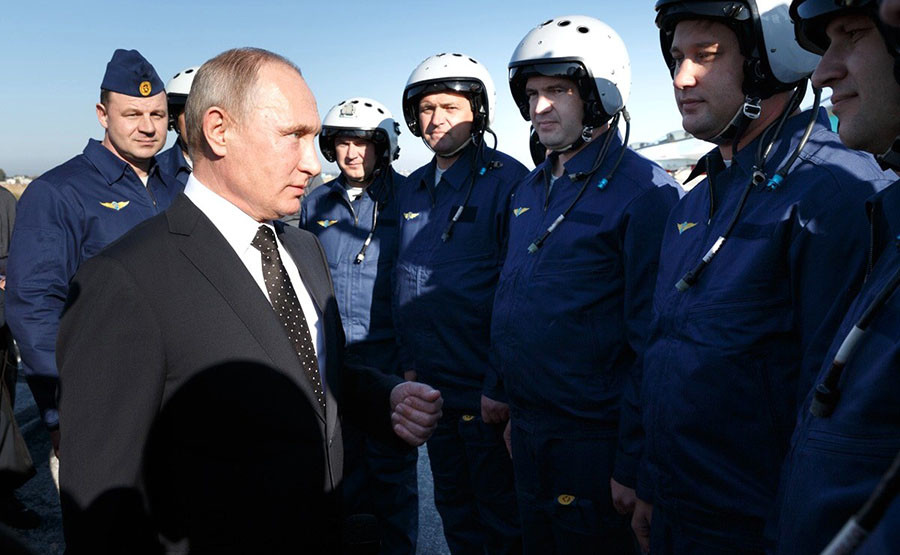
Syria was “preserved as a sovereign and independent state” and refugees are returning home, the Russian president noted. He is expected to discuss the organization of a Syrian people’s congress and further steps towards peaceful settlement, with the leaders of Egypt and Turkey on Monday.
President Assad once again expressed deep gratitude to the Russian Air Force, following up on his surprise visit to Russia’s Sochi just three weeks ago, when the Syrian leader had also expressed thanks for Moscow’s help in the fight against terrorism.
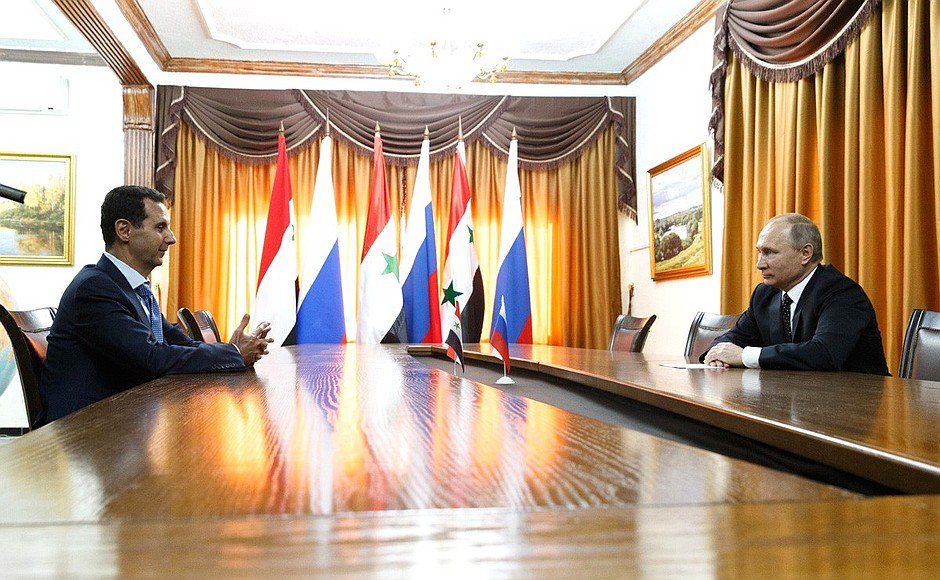
During his visit to Russia's Khmeimim air base in Syria, Vladimir Putin had a meeting with President of Syria Bashar al-Assad
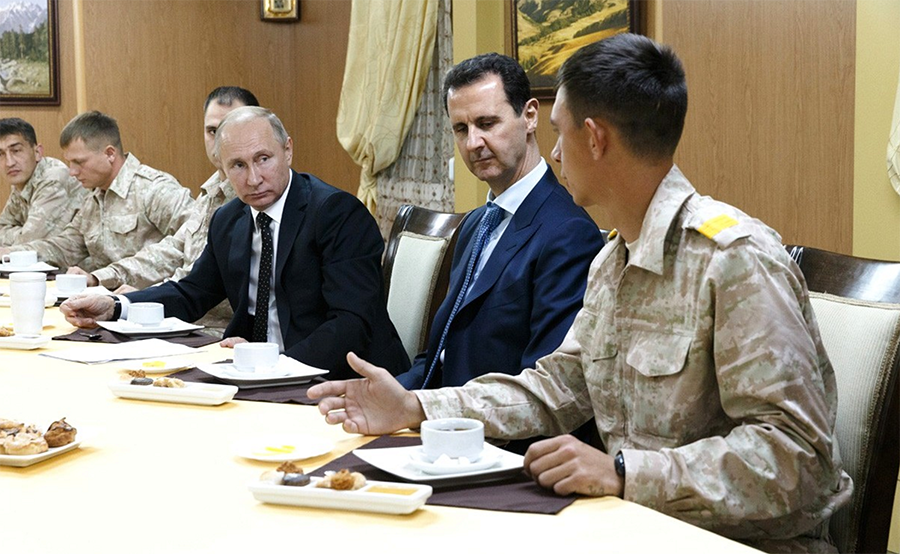
The Russian General Staff declared the liberation of Syria from IS on December 6, saying that “all terrorist units of ISIS” in the country had been destroyed. Putin later said that the military work was completed “with a full victory,” adding that there “might be some spots of resistance.”
Russia’s campaign in Syria was launched on September 30, 2015, after Damascus asked for Moscow’s help in the fight against extremist Islamist forces trying to overthrow the government. In March 2016, Russia partially withdrew its air force from Khmeimim Airbase, saying its objectives there had been largely achieved.
 https://www.rt.com/news/412690-putin-sy ... -khmeimim/
https://www.rt.com/news/412690-putin-sy ... -khmeimim/
Published time: 11 Dec, 2017 09:59
Edited time: 11 Dec, 2017 17:16
Russian President Vladimir Putin has ordered the withdrawal of Russian troops from Syria. He announced the move during his first visit to the country, as he arrived with no advance notice at Khmeimim Airbase in Syria’s Latakia province on Monday morning.
A “significant part” of the Russian military contingent in Syria should return to Russia, Putin announced, addressing Russian military personnel at Khmeimim. The order to withdraw followed the defeat of “the most battle-hardened grouping of international terrorists” by the Russian and Syrian militaries in the space of two years.
As he arrived at the base, which houses Russian forces assisting Syria in the battle against Islamic State terrorists (IS, formerly ISIS), Putin was greeted by his Syrian counterpart, Bashar Assad, and by Russian Defense Minister Sergey Shoigu, in a brief stop on the Russian leader's way to bilateral talks with Egyptian President Abdel Fattah al-Sisi in Cairo, followed by a meeting with Turkish President Recep Tayyip Erdogan in Ankara.
The commander of the Russian forces in Syria, Colonel-General Sergey Surovikin, informed Putin that about 70,000 sq km of Syrian territory had been liberated and 32,000 terrorists killed in the last seven months of the operation. Russian special forces, military police, sapper teams and 25 aircraft will now leave Syria, and the field hospital will be removed.
Putin also warned that should terrorists attempt to “rear their heads” in Syria again, Russia will strike them as “they have never seen before.” Russia will continue to use Khmeimim Airbase and the Syrian port of Tartus, which provides technical support for the Russian Navy, while the Russian Reconciliation Center for Syria will also remain.

Syria was “preserved as a sovereign and independent state” and refugees are returning home, the Russian president noted. He is expected to discuss the organization of a Syrian people’s congress and further steps towards peaceful settlement, with the leaders of Egypt and Turkey on Monday.
President Assad once again expressed deep gratitude to the Russian Air Force, following up on his surprise visit to Russia’s Sochi just three weeks ago, when the Syrian leader had also expressed thanks for Moscow’s help in the fight against terrorism.

During his visit to Russia's Khmeimim air base in Syria, Vladimir Putin had a meeting with President of Syria Bashar al-Assad

The Russian General Staff declared the liberation of Syria from IS on December 6, saying that “all terrorist units of ISIS” in the country had been destroyed. Putin later said that the military work was completed “with a full victory,” adding that there “might be some spots of resistance.”
Russia’s campaign in Syria was launched on September 30, 2015, after Damascus asked for Moscow’s help in the fight against extremist Islamist forces trying to overthrow the government. In March 2016, Russia partially withdrew its air force from Khmeimim Airbase, saying its objectives there had been largely achieved.
Triste sina ter nascido português 
- P44
- Sênior

- Mensagens: 55308
- Registrado em: Ter Dez 07, 2004 6:34 am
- Localização: O raio que vos parta
- Agradeceu: 2765 vezes
- Agradeceram: 2445 vezes
Re: SYRIA
Bolovo,
Os EUA concerteza andam na Siria a tentar salvar os amigos do ISIS que sobraram...
Os EUA concerteza andam na Siria a tentar salvar os amigos do ISIS que sobraram...
Triste sina ter nascido português 
- FCarvalho
- Sênior

- Mensagens: 38030
- Registrado em: Sex Mai 02, 2003 6:55 pm
- Localização: Manaus
- Agradeceu: 5756 vezes
- Agradeceram: 3277 vezes
Re: SYRIA
Idiossincrasias da política internacional. Os russos também não foram convidados a estar no leste da Ucrânia, mas estão lá, enquanto a Otan foi convidada pela Ucrânia. Assim também na Crimeia, e Georgia, na região da Ossétia. A Síria é só mais um exemplo dessa hipocrisia reinante no cenário internacional.J.Ricardo escreveu:Isso que é complicado, na verdade os únicos com legitimidade lá são os russos...
O problema é que os yankees passaram os último 25 anos achando que eram o dono do quintal de forma praticamente inconteste. Só que agora tem um certo urso que acordou da sua longa hibernação, e está novamente disposto a disputar a primazia do espaço perdido.
Sem contar com um certo dragão que anda por aí mostrando as garras de vez em quando.
A águia americana não está mais tão só quanto supunha.
abs
Carpe Diem
- FCarvalho
- Sênior

- Mensagens: 38030
- Registrado em: Sex Mai 02, 2003 6:55 pm
- Localização: Manaus
- Agradeceu: 5756 vezes
- Agradeceram: 3277 vezes
Re: SYRIA
Os americanos "se acham" Bolovo. Consideram-se o "ó do borogodó" da democracia. A liderança mundial que o mundo nunca quis, ou pediu, mas que eles se auto-intitularam por livre e espontâneo oportunismo.Bolovo escreveu: Gostaria de saber o que os EUA estão fazendo por lá, sendo que o ISIS já foi declarado derrotado tanto na Síria como no Iraque durante essa semana. E é aquilo que o Ricardo aí disse. A Síria, goste do Assad ou não, ainda é um país soberano, representado na ONU, que pediu suporte ao governo russo e esse atendeu o pedido enviando uma força expedicionária. A coalizão liderada pelos EUA está atuando na Síria de maneira ilegal (é um fato, não uma opinião), então quem são eles para falar os russos ou os sírios podem ou não fazer em seu próprio território? Ademais, Putin foi hoje a Síria, se encontrou com o Assad e ordenou a retirada das forças russas (uma pequena parte continuará por lá, entretanto).
Enfim, americanos são americanos.
No mais, como o P44 já disse, eles estão lá tentando salvar o que resta da revolução síria. Ou mais propriamente a sua vã tentativa de derrubar mais um presidente inamistoso aos seus interesses sem ter sido chamado ou eleito para isso.
Tipicamente yankee...
abs.
Carpe Diem
- P44
- Sênior

- Mensagens: 55308
- Registrado em: Ter Dez 07, 2004 6:34 am
- Localização: O raio que vos parta
- Agradeceu: 2765 vezes
- Agradeceram: 2445 vezes
Re: SYRIA
The Federation Council ratified the agreement on the expansion of the Russian Navy item in Tartus (Syria). Now this is not an item and our full database!
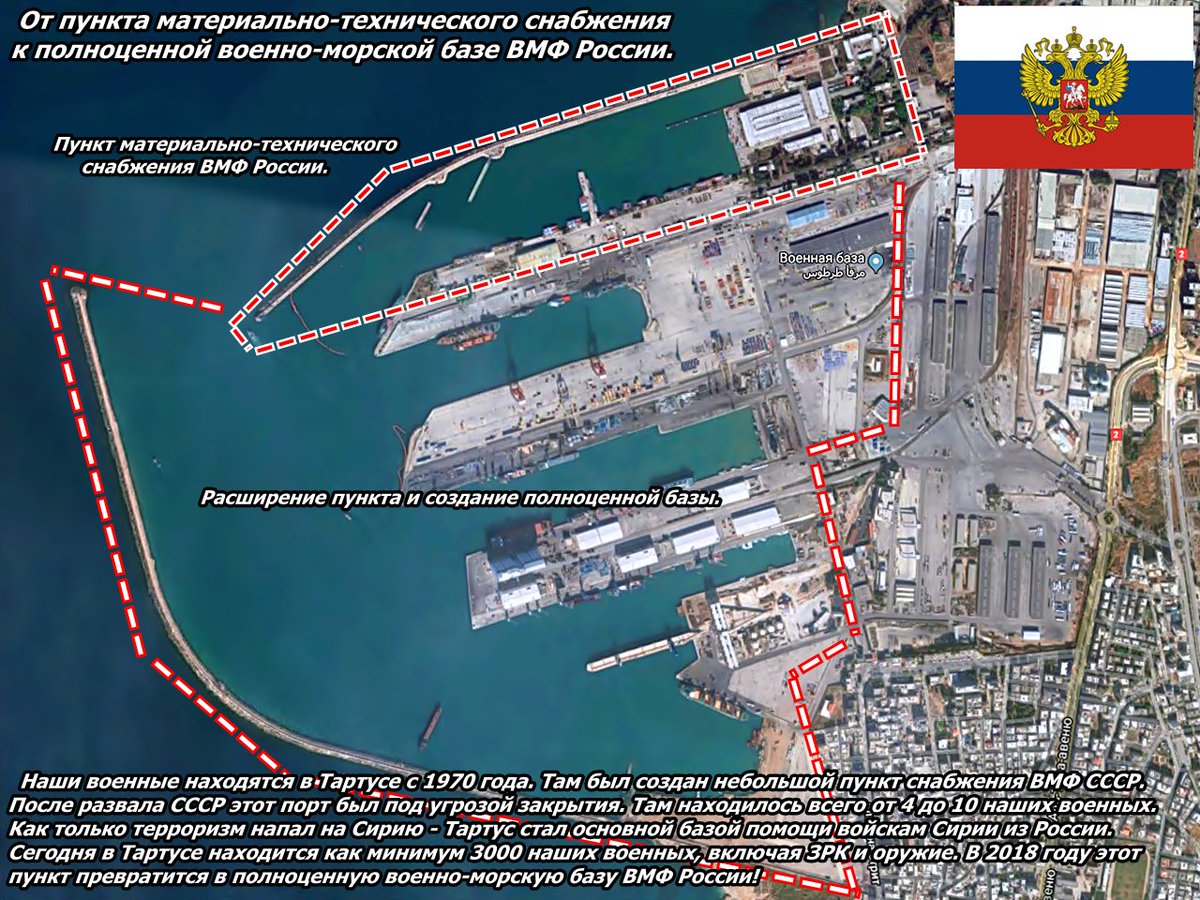

Triste sina ter nascido português 
- P44
- Sênior

- Mensagens: 55308
- Registrado em: Ter Dez 07, 2004 6:34 am
- Localização: O raio que vos parta
- Agradeceu: 2765 vezes
- Agradeceram: 2445 vezes
Re: SYRIA
Country Risk
Turkish intervention in Syria likely to force US to choose between NATO ally, Turkey, and the YPG
Ege Seckin - IHS Jane's Intelligence Weekly
22 January 2018
http://www.janes.com/article/77233/turk ... nd-the-ypg
Turkish intervention in Syria likely to force US to choose between NATO ally, Turkey, and the YPG
Ege Seckin - IHS Jane's Intelligence Weekly
22 January 2018
http://www.janes.com/article/77233/turk ... nd-the-ypg
Triste sina ter nascido português 
- Wingate
- Sênior

- Mensagens: 5130
- Registrado em: Sex Mai 05, 2006 10:16 am
- Localização: Crato/CE
- Agradeceu: 819 vezes
- Agradeceram: 239 vezes
Re: SYRIA
E os abutres continuam predominando na América do Sul...FCarvalho escreveu:Idiossincrasias da política internacional. Os russos também não foram convidados a estar no leste da Ucrânia, mas estão lá, enquanto a Otan foi convidada pela Ucrânia. Assim também na Crimeia, e Georgia, na região da Ossétia. A Síria é só mais um exemplo dessa hipocrisia reinante no cenário internacional.J.Ricardo escreveu:Isso que é complicado, na verdade os únicos com legitimidade lá são os russos...
O problema é que os yankees passaram os último 25 anos achando que eram o dono do quintal de forma praticamente inconteste. Só que agora tem um certo urso que acordou da sua longa hibernação, e está novamente disposto a disputar a primazia do espaço perdido.
Sem contar com um certo dragão que anda por aí mostrando as garras de vez em quando.
A águia americana não está mais tão só quanto supunha.
abs
Wingate

- FOXTROT
- Sênior

- Mensagens: 7718
- Registrado em: Ter Set 16, 2008 1:53 pm
- Localização: Caçapava do Sul/RS.
- Agradeceu: 267 vezes
- Agradeceram: 108 vezes
Re: SYRIA
Face as inúmeras agressões sionistas, finalmente um de seus F-16 foi confirmadamente abatido (para os sionistas teve problemas técnicos).
https://br.sputniknews.com/oriente_medi ... -acidente/
Saudações
https://br.sputniknews.com/oriente_medi ... -acidente/
Saudações
"Só os mortos conhecem o fim da guerra" Platão.
